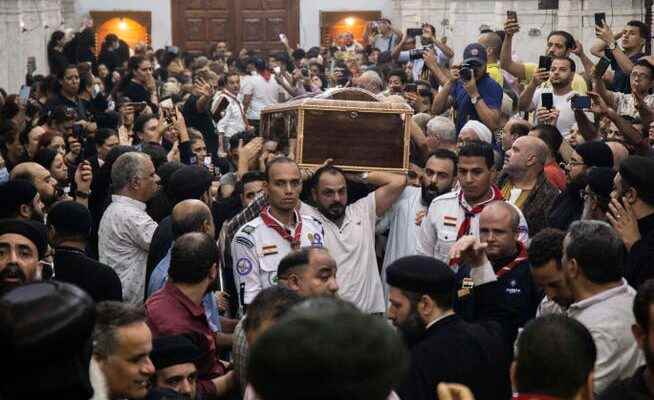A fire in a church near Cairo killed 41 people on Sunday. Even if the tragedy was an accident, the Coptic Christians on the Nile are once again realizing how fragile their situation is.
Funeral service for the Coptic victims of the fire disaster in Cairo.
Hundreds of mourners crowd Sunday night into the two churches in Giza where services for the dead are being held. Men and women burst into tears as the coffins of the deceased are brought in. Coptic priests say prayers for the victims of the tragedy that has struck the Christian community in the working class district of Imbaba in Giza, southwest of Cairo.
The fire in a church killed 41 people in the morning, including many children. The fire had apparently been triggered by a short circuit and spread so quickly that countless participants in a church service that was taking place were surprised.
Apparently, panic broke out in the crowded church. Neighbors tried to carry children out of the burning building, witnesses told the AFP news agency, but that was difficult because of the smoke. “Some even jumped out of the windows in their desperation,” said a resident.
Others complained about the apparently late arrival of the fire brigade. A resident of the neighborhood said it took rescue workers more than an hour and a half to get to the scene of the accident. The fire station is only five minutes away.
The position of the Copts is fragile
The tragedy once again showed the Coptic Christians in Egypt how vulnerable they are. Because even if the fire was apparently not caused by outside influences, it reminded the members of the religious minority on the Nile of dark episodes from their history.
A few years ago, for example, Coptic churches in Egypt were repeatedly burned down. “I was deeply saddened by this, but not shocked,” says Farah Rafik, a young journalist from Cairo. “Because we Copts had to suffer such tragedies again and again.”
The Copts, who make up about 10 percent of Egypt’s approximately 100 million inhabitants, form one of the oldest Christian communities in the world. But their position has always been difficult. As early as Roman times, they were repeatedly subjected to persecution.
Later, the Muslim rulers who conquered Egypt in the seventh century forbade them from building churches and made them second-class citizens. Due to persecution, lack of rights and high taxes, more and more Copts converted to Islam. Thus, in the 14th century, they lost their status as the majority in the country.
Dependent on the goodwill of the rulers
Most of those Copts who have remained true to their faith to this day live as poor farmers in the upper Nile valley. However, some have managed to rise within Egyptian society – such as the former UN Secretary-General Boutros Boutros-Ghali or the family of the entrepreneur Samih Sawiris, who is well-known in Switzerland.
However, the Copts in Egypt, which was dominated by Muslims, were never regarded as completely equal. They were therefore repeatedly dependent on the goodwill of the respective rulers. Especially under Presidents Sadat and Mubarak, during whose reign Egypt became more and more Islamic, the Christians on the Nile felt increasingly threatened.
It was worst for the Muslim Brotherhood, who came to power after the 2011 Arab Spring. When its President Mohamed Morsi was overthrown by the military in 2013, radical Islamists took revenge on Christians, among others.
Again and again churches went up in flames and bombs exploded during services. “When I went to church, I had to show my ID card and go through a security checkpoint,” says Rafik. “It was so bad back then that my family even considered leaving the country.”
Sisi presents herself as the protector of Christians
Morsi’s successor, Abdelfatah al-Sisi, who now rules the country with an iron fist and has declared the Muslim Brotherhood terrorists, presents himself as the protector of Christians. The ex-general was Egypt’s first president to attend the Coptic Christmas service and in February even nominated a Christian as the country’s chief judge for the first time.
Copts have also ended up in prison under Sisi’s authoritarian regime – such as the human rights activist Patrick Zaki, who was held for almost two years before he was released under pressure from the EU. Nonetheless, many Christians seem to welcome the rule of the President.
“We’re actually doing better under the new government,” says Rafik. “We feel safer and better integrated.” She also notices that many of her friends who once left the country have now returned.
Overcrowded, illegal churches
After the fire in the church in Giza, Sisi reacted immediately and immediately announced an investigation and new security measures. Nevertheless, the situation for Christians in Egypt is not easy even today. “Christian women are still kidnapped, forcibly converted to Islam and murdered priests,” says Rafik.
In addition, the Copts are only allowed to build churches to a limited extent. A 1934 law banned the construction of Christian places of worship in the vicinity of government buildings, schools or mosques and required express permission from the president for each new building.
The government passed a law in 2016 that is intended to simplify church building and has also licensed countless new churches in the last three years. Nevertheless, local authorities or angry neighbors prevent many new construction projects to this day. For this reason, especially in poorer areas, Christians often resort to overcrowded, illegal prayer houses that have hardly any security precautions – with possibly fatal consequences.
